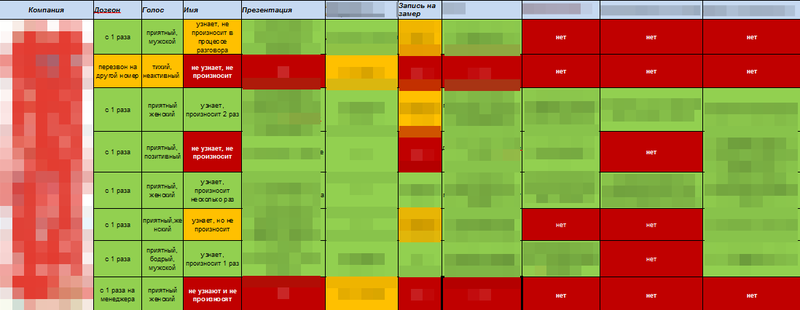We program sales managers
 When you offer clients assistance in writing scripts, it’s good when the client says “ We will write ourselves, what is there to pay money for ”, although this is not always quick and effective. But, more often we hear “ Our employees speak perfectly well without scripts, they only hinder ”, or “ We have unique products / services, and clients are unpredictable, and no scripts will help us ”.
When you offer clients assistance in writing scripts, it’s good when the client says “ We will write ourselves, what is there to pay money for ”, although this is not always quick and effective. But, more often we hear “ Our employees speak perfectly well without scripts, they only hinder ”, or “ We have unique products / services, and clients are unpredictable, and no scripts will help us ”.Today we will talk about why this is not so, and how to write an effective script for yourself.
We have everything unique, scripts will not help
This objection is most common.
But I am convinced that even if you have nanotechnology and a unique product that no one in the world has heard about, the more you need a meticulously polished script that will allow you to briefly and clearly explain why this product is needed by a potential buyer.
')
Sellers themselves will understand how and what to say
Let's be honest - there are no perfect employees. Turnover and newcomers to the sales department is a constant phenomenon. Will each new seller develop their own scenarios? But what about years of experience working with clients? But what about standards, image, level of service? The list of questions is endless.
With 90% confidence, we can say that your company needs prescribed telephone conversation scripts. You make life easier for yourself, beginners and even experienced managers. You are guaranteed to raise sales. We have cited several illustrative examples in previous articles.
We will write ourselves
Yes, in a good way, the sales manager can / should do it. He oversees the managers during their conversations, builds the logic of the conversation, prescribes the answers to customer objections, comes up with the selling end of the conversation and knows the sale process best of all.
In fact, if the manager has never done this, it will take him a lot of time to write the script, to adjust and implement it. And if the implementation of a manager cannot be removed, then the first preparatory part of the work can certainly be outsourced to professionals.
Our first script was the head of the telemarketing department, who wrote every day for 1.5 months, building logic, registering objections.
If you are determined to write the script yourself, then we want to share the experience. Short plan:
- Stage 1. Analysis of competitors and the current situation at home.
- Stage 2 Brainstorm.
- Stage 3 Writing a script or scripts.
- 4 stage. Test check and adjustment.
- Stage 5 Implementation and constant adaptation.
Stage 1. Analysis of competitors and the current situation in their sales department
We have already written about the results of the analysis of competitors for the window company.
If you do not periodically query competitors, it's time to do it.
It is better, of course, to record all telephone conversations in order to listen to them in a relaxed atmosphere as many times as necessary.
Pay attention to the manager's voice, whether he presents the company or the offer, how it does, identify needs, takes contacts, if the manager is proactive or passively answers the caller's questions - learn all the nuances.
Call the results in the table. Columns can be different: voice, product presentation, contact receipt, etc. So you can compare the same parameters. Our table had 10 points.

Of course, enter your company in the same table and honestly analyze. By the way, you can contact us, make such a call for free and send you.
Important! Look for positive in calls to competitors. The goal is not to find flaws (you will hear them right away), but to find chips and introduce them in yourself.
Stage 2 Brainstorm
We recommend not to skip this stage, so that all sales participants realize the importance of implementations, actively participate in creating what they should use.
Get together with the entire sales department or experienced managers headed by a manager. Designate an employee to write ideas.
Listen to the calls of competitors, discuss the components of your phone calls. What stages they usually contain: greeting, acquaintance, company presentation, fight with objections.
What goal do you want to achieve: get a contact, make an appointment, leave a certain impression?
All these are important questions that will allow you to create a script with the help of which you will often seek from the client what you need.
During the brainstorming, record all possible objections that customers have, write down the answers to them and options.
Play the usual conversation with the client, write down the main stages. All this will facilitate the work in the third stage.
By the time this stage takes from 4 hours to 8 hours.
Stage 3 Writing a script or scripts
This is where the fun begins. The person responsible for writing the script (often the manager) needs to bring together the information after the brainstorming session. When developing the interface of our product for sales scripts, we took the mind map as a basis and recommend using them anyway. So it is easier to build the logic of conversation.
This stage is one of the most laborious.
It is useful here to listen to phone calls that usually occur in your sales department.
Each script should follow the logic of 5 stages of sales. After all, the appointment of a meeting, for example, or sending a CP is also a sale, although only one of the stages of a “big” deal.
So, 5 standard steps:
- Contact / acquaintance
- Identifying needs
- Presentation
- Work with objections
- Completion of the transaction.
Here are their script for you and paint. You develop interesting pieces at each stage, use verified words, your personal achievements and the techniques of experienced and successful managers.
4 stage. Combat check and adjustment
Before you implement, you need to work out this script, first in the form of a game with sales managers, and then on real customers. All shoals that are sure to be, you must identify, analyze and make adjustments.
By the way, largely due to the stage of updating scripts and the rapid implementation of these changes in our work, we thought hard about a software solution to the problem of using scripts.
Stage 5 Implementation and ongoing adaptation
The implementation is not less time-consuming and complex process, and even more than writing. Even if you did not miss the second stage - you can be sure that some managers inside themselves did not agree with these changes, and will work “out of habit”, as it seems to them more effectively. Observe the scripts they will not, there will be resistance.
And here will only relentless control, encouragement and punishment, the will of the head.
And of course, a demonstration of the result: “Look, guys, before the scripts we assigned 5 meetings to 100 calls, and now 10. Your fees are growing.”
Work, work, and still work
It may seem to some that the work is finished, and you can enjoy the effect. But this is not so - the key to success in the ongoing work on the effectiveness of scripts.
Our products and services change, new objections arise, managers find new effective sales techniques - all this needs to be monitored and timely adjusted their scenarios.
In the end, you can even do A / B testing to achieve better results.
Often they forget about this stage by ordering scripts from a third-party company, or they receive scripts from a contractor in such a way that it is extremely difficult to correct them on their own or it is simply not convenient to do it often.
In conclusion, I would like to say that the business of writing and implementing sales scripts is not easy, but it is absolutely necessary and yielding results.
It is important not to stop halfway!
Much in this process is made more convenient and easier with the help of our solution . Contact contacts are also there, if you want us to analyze your script.
How our decision makes life easier, and work more efficiently - we wrote in one of the previous articles .
Source: https://habr.com/ru/post/290674/
All Articles